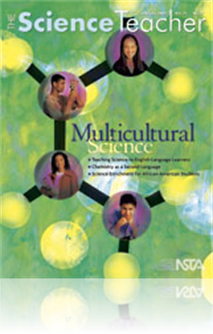All The Science Teacher resources
Journal Article
The experts address the following question in this month’s column: How do solutes reduce the vapor pressure of a solvent?...
Journal Article
Many ESOL (English for Speakers of Other Languages) students are in classes primarily devoted to improving English language skills at the expense of other disciplines, such as science. The authors designed a project that brought ESOL students into a ...
Journal Article
Chemistry as a Second Language
Chemistry is a unique language in and of itself that can be difficult for students to understand. As a result, the basic curriculum approach described in this article was designed to make chemistry more accessible to students, especially those who ar...
Journal Article
The universality of the genetic code has allowed DNA isolated from a specific organism to be transferred and incorporated in another organism, transforming bacterial, yeast, plant, and animal cells. This transformation ability is the essence of recom...
Journal Article
This article provides a number of practical strategies for teaching science to English Language Learners (ELLs). The strategies were developed by educators participating in science/ELL workshops and through the author’s own experience as a science ...
Journal Article
The term inquiry has been used to form curriculum goals, design instructional strategies, and assess learning. The term also describes what scientists do. Within the science classroom, inquiry is used to promote activity-oriented learning that ref...
Journal Article
Commentary: Personal Guiding Frameworks and Equity Teaching Practices
The No Child Left Behind Act of 2001 (NCLB) requires that science educators use research-based teaching strategies. This month’s Commentary column cites the following references as excellent resources for science educators to use as personal guidin...
Journal Article
Editor’s Corner: Opening the Door to Science
The national standards have refocused our thinking about teaching and learning science. Science isn’t reserved only for future astronauts or heart surgeons. Everyone can do science, and previously we hadn’t been reaching the majority of our stude...
Journal Article
I Lost the Answer Key! Authentic science flourishes when a teacher loses the prepared answer key
A popular exploratory activity is “Mystery Powders,” a chemistry investigation during which students identify the composition of white, powdery mixtures. In this article, the teacher loses the key to the mystery powders lab and the students take ...
Journal Article
Racing with the Sun: Students learn physics while designing a solar-powered vehicle
Through this yearlong inquiry investigation, high school physics students design, create, and race a solar-powered vehicle. The design process helps students learn invaluable science, technology, mathematics, communication, and critical thinking skil...
Journal Article
Editor's Corner: Designing Inquiry Pathways
The Science Teacher’s editor shares thoughts on the current issue....
Journal Article
Career of the Month: An Interview with Perfumer Christopher Laudamiel
This column shares interviews with professionals using science in the workplace. This month’s column focuses on the job of a perfumer....
Journal Article
The Idea Bank provides tips and techniques for creative teaching, in about 1,000 words. In this month’s Idea Bank, the science faculty is looking for ways to engage all students in a course that allows them to achieve their greatest individual pote...




